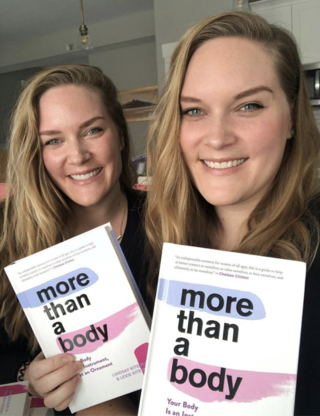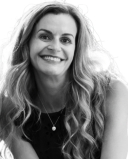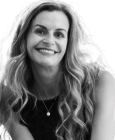Body Image
More Than a Body: Rethinking Body Positivity
An interview with Lexie and Lindsay Kite.
Posted December 28, 2020
Drs. Lexie Kite and Lindsay Kite are co-founders of the non-profit Beauty Redefined and More Than a Body, LLC, and experts in the work of body image resilience. Their forthcoming book, More Than a Body hits shelves December 29, 2020.
Although many well-intentioned people promote positive body image from the basis of helping women realize and embrace their beauty, More Than a Body changes the conversation about body image by telling girls and women they are more than beautiful. Lexie and Lindsay assert positive body image is about feeling positively toward your body overall, not just what it looks like.
With their book coming out soon, I talked with them about it, their work as body image advocates, and what it's like to be women working in a field that is so personal.
Q: Let’s start with the title of your forthcoming book, More than A Body: Your Body Is an Instrument, Not an Ornament. I’m obviously a fan of this mantra, as I quoted you at the beginning of my recent body image book for girls. How and when did this mantra originate?
A: The paradigm shift of experiencing your body as an instrument instead of an ornament is life-changing for so many people! We’ve been shouting this mantra from the rooftops for nearly 10 years. It came together quite naturally as we were writing, speaking, and researching about how to help people overcome the extremely common state of appearance anxiety and body monitoring (known as self-objectification) that is at the core of so many peoples’ body image struggles. We feel like our work stands apart from much of the body-positive activism and body image interventions that are popular today because, as we detail in our book, we are less interested in expanding the definition of “beautiful” and more interested in helping girls, women, and all people see themselves as more than beautiful, more than bodies, and more than ornaments whose values derives from how they appear.
Q: You’ve been health advocates, activists, and educators for a long time, why did you decide to write this book now?
A: To be honest, after wrapping up 10 straight years of college when we graduated with our PhDs in 2013, we had zero interest in doing the work of publishing excerpts from our dissertations or anything else. We’ve spent the years since then doing the work of “public scholars,” in a way, by sharing our work with a big audience on our blog, social media, and in speaking events. When a literary agent approached us two years ago, stating she was a big fan of our work and thought it was time we published a book and reached a bigger audience, we finally decided it was time to take the plunge. Needless to say, despite the incredible amount of work that goes into publishing a book, we are thrilled we did it and so honored that our agent encouraged us to take this on.

Q: You discuss objectification throughout the book. When does objectification become self-objectification? How can both forms of objectification be remedied by individuals when they originate outside of us?
A: We live in a world that objectifies women and girls from every conceivable angle. The objectification is so normal and unquestioned that it is rendered basically invisible to the untrained eye, though most girls and women can recognize that they feel uncomfortable in one way or another when they see it. Objectification is at play when the camera tilts up and down a woman’s body on that TV show while the dialogue revolves around her looks, or when women in movies are paired with much older men who are allowed to age while they show no signs of life, like wrinkles, grey hair, or anything but an extremely slim but curvaceous body. Objectification is at play when we police what little girls are wearing in the name of “modesty” or “dress code violations” while boys are rarely asked to cover up for the sake of onlookers. When you grow up in a world that objectifies women constantly, it is perfectly natural to live in a state of self-objectification, in which you monitor yourself from an outsider’s perspective, anxiously evaluating your looks instead of focusing on how you feel, what you can do, and how you are valuable outside of your appearance.
Objectification is never going away. Too many industries and individuals profit from making sure girls and women believe their value and power derive from their appearance alone and making sure boys and men believe that girls and women are most valuable for their decorative appeal and “consumability.” And while self-objectification is a normal state for too many people, it is possible to identify when you are in that state of being and call yourself back home. Our book takes on that challenge – of helping people see objectification and self-objectification all around them, and uproot it every day for the rest of their lives.
Q: How does it feel to be a woman who focuses on these issues? How does this affect your own body image?
A: It is extremely difficult to be a woman with expertise in body image who speaks and engages publicly on the topic of bodies and beauty. Although we do our best to avoid the comments sections of media interviews we do or talks or videos featuring us posted online, it is clear that the feedback about us falls into two distinct camps, both of which reinforce the need for our work! We hear some version of “you are just fat and ugly and jealous of beautiful women!” or “you’re too young and pretty to know what body shame feels like. Just wait.” Both of these comments silence us and reduce us to our bodies in the most ironic form of objectification, and both point to the need for people to understand women as more than bodies, whether you think those bodies are too ideal or too far from it.
Thankfully, our work in body image resilience has changed both of our lives completely. As you’ll read about in the book, we get pretty personal with some experiences we’ve had growing up (through journal entries taken right from 1998!) and things we’ve dealt with as women trying to navigate life and love and careers. As we always say, body image resilience helps people to take their pain and make it their purpose, their power, their platform to stand upon. It definitely has for us. We are both grateful for the body shame we have experienced throughout our lives because it has propelled us down a path to help other people identify and overcome their pain so they can be more – more of who the world needs them to be and more of who they deserve to be – not less.
Q: What’s your advice to women who feel that both their own health and appearance would benefit from weight loss?
A: Many people ask us this question when we post about untangling health and weight. It is completely natural to want to lose weight in our culture that is entirely fatphobic and constantly pummeling us with messages about what weight loss can do for you (“lose weight, feel great!” “What will you gain when you lose?” “I lost 100 lbs and found a husband!” etc.). What we know, and what we detail at length in our book, is that focusing on weight and weight loss is not sustainable, and doesn’t support healthy behaviors. Research shows that when women commit to working out in an effort to lose weight, and they don’t lose as much as they think they should, they stop working out. What we recommend (and what has made all the difference in our own relationships to exercise), is to stop weighing yourself and work out with a focus on other indicators than weight – your endurance, speed, mental health. Focus on how you feel and what you can do, with goals that cater to that focus (“I’m going to walk with my friend two times per week,” or “I’m going to take five dance classes this month,” or whatever feels fun and sustainable). When you leave your weight out of the equation, you are better equipped to use your body as an instrument and reap all the benefits that come with it (including your internal indicators of health like your blood sugar, blood pressure, cholesterol, etc).
Q: For women who are struggling with their body image, what one thing do you suggest they do today to get started on their journey towards positive body image?
A: We go into much greater detail about this practice of inner child work in the book, but the short version is to think back to your childhood and imagine yourself then. Write a letter to yourself, letting that “little you” know who she is, what she’s up against, and what you wish she knew then. This is a powerful exercise to help you tap back into who you are, as you reconnect with your own inner child and start to treat yourself with more compassion and humanity. You are more than a body. You knew that once. You can know it again.




